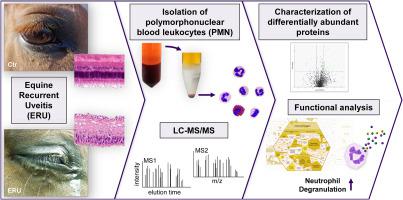Journal of Proteomics ( IF 3.3 ) Pub Date : 2020-09-23 , DOI: 10.1016/j.jprot.2020.103989 Maria Weigand 1 , Stefanie M Hauck 2 , Cornelia A Deeg 1 , Roxane L Degroote 1

|
Equine recurrent uveitis (ERU) is a spontaneous, remitting-relapsing autoimmune disease driven by the adaptive immune system. Although T cells are described as the main effector cells in pathogenesis, granulocytes have also emerged as possible disease mediators. To explore the role of these innate immune cells, we investigated the whole cell proteome of granulocytes from equine recurrent uveitis cases and healthy controls. Among the 2362 proteins identified by mass spectrometry, we found 96 proteins with significantly changed abundance between groups (p < 0.05, fold change >1.2), representing 4.1% of total granulocyte proteome. Within these differential identifications, calgranulin B, a protein associated with pathogenesis in other autoimmune diseases, showed highest abundance in equine recurrent uveitis (18 fold).
For a better interpretation of the results from our hypothesis-generating approach, we added a threshold for biological significance (ratio ERU/controls >2: 36 proteins) to the proteins with increased abundance in equine recurrent uveitis and analyzed their allocation to the subsets within the Immune System superpathway. The 36 differentially abundant proteins predominantly associated to RAF/MAP kinase cascade, MHC-I-mediated antigen presentation and neutrophil degranulation, suggesting a latently activated phenotype of these innate immune cells in disease. Raw data are available via ProteomeXchange with identifier PXD013648.
Significance
Our study provides new insights into the protein repertoire of primary equine granulocytes and identifies protein abundance changes associated to equine recurrent uveitis (ERU), an organ specific, spontaneously occurring autoimmune disease. We show that granulocyte proteins with increased abundance in ERU strongly associate to RAF/MAP kinase signaling, MHC-I antigen presentation and neutrophil degranulation, pointing to a more activated state of these cells in ERU cases. Since cells were obtained in quiescent stage of disease, latent activation of granulocytes underlines the role of these innate immune cells in ERU.
These findings are highly relevant for veterinary medicine, further establishing the importance of granulocytes in this T cell-driven autoimmune disease. Moreover, they have translational quality for autoimmune uveitis in man, due to strong similarity in disease occurrence, progression and pathogenesis.
中文翻译:

马粒细胞的蛋白质组异常与器官特异性自身免疫性疾病的潜在激活状态有关
马复发性葡萄膜炎(ERU)是由适应性免疫系统驱动的自发性复发性自身免疫性疾病。尽管T细胞被描述为发病机理中的主要效应细胞,但粒细胞也已成为可能的疾病介质。为了探究这些先天免疫细胞的作用,我们研究了马复发性葡萄膜炎病例和健康对照组中粒细胞的全细胞蛋白质组。在质谱鉴定的2362种蛋白质中,我们发现96种蛋白质的组间丰度发生了显着变化(p <0.05,倍数变化> 1.2),占粒细胞总蛋白质组的4.1%。在这些差异性鉴定中,钙调蛋白B(一种与其他自身免疫性疾病的发病机制相关的蛋白)在马复发性葡萄膜炎中显示出最高的丰度(18倍)。
为了更好地解释我们的假设生成方法的结果,我们为马复发性葡萄膜炎中丰度增加的蛋白质增加了生物学意义(ERU /对照> 2:36种蛋白质)的阈值,并分析了它们在其中的子集的分布免疫系统的超级通道。36种差异丰富的蛋白质主要与RAF / MAP激酶级联反应,MHC-1介导的抗原呈递和嗜中性粒细胞脱粒有关,表明这些先天性免疫细胞在疾病中的潜伏表型。原始数据可通过ProteomeXchange获得,其标识符为PXD013648。
意义
我们的研究为原代马粒细胞的蛋白质库提供了新的见解,并鉴定了与马复发性葡萄膜炎(ERU)有关的蛋白质丰度变化,ERU是一种器官特异性的自发性自身免疫性疾病。我们显示,在ERU中具有增加的丰度的粒细胞蛋白与RAF / MAP激酶信号传导,MHC-1抗原呈递和中性粒细胞脱粒强烈相关,指向这些细胞在ERU病例中处于更活化的状态。由于细胞是在疾病的静止期获得的,因此粒细胞的潜在激活突出了这些先天免疫细胞在ERU中的作用。
这些发现与兽药高度相关,进一步确立了粒细胞在这种T细胞驱动的自身免疫性疾病中的重要性。此外,由于在疾病发生,发展和发病机理上的高度相似性,它们具有人类自身免疫性葡萄膜炎的翻译质量。



























 京公网安备 11010802027423号
京公网安备 11010802027423号